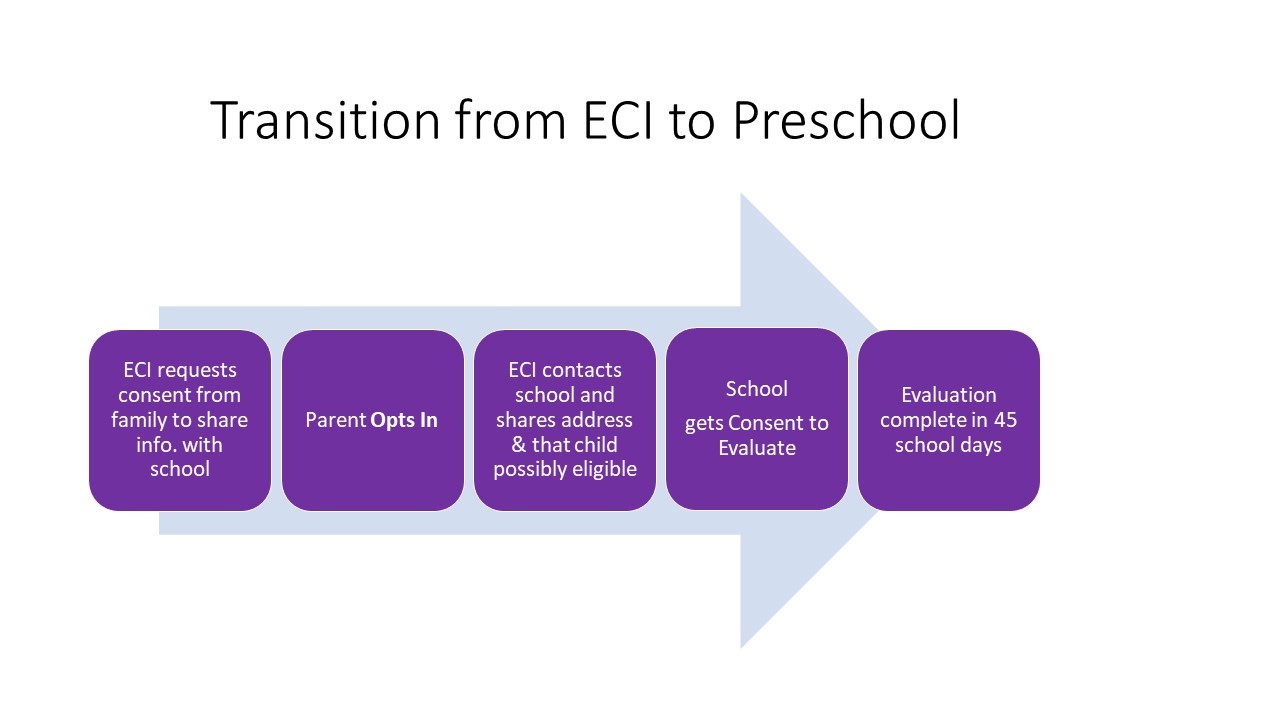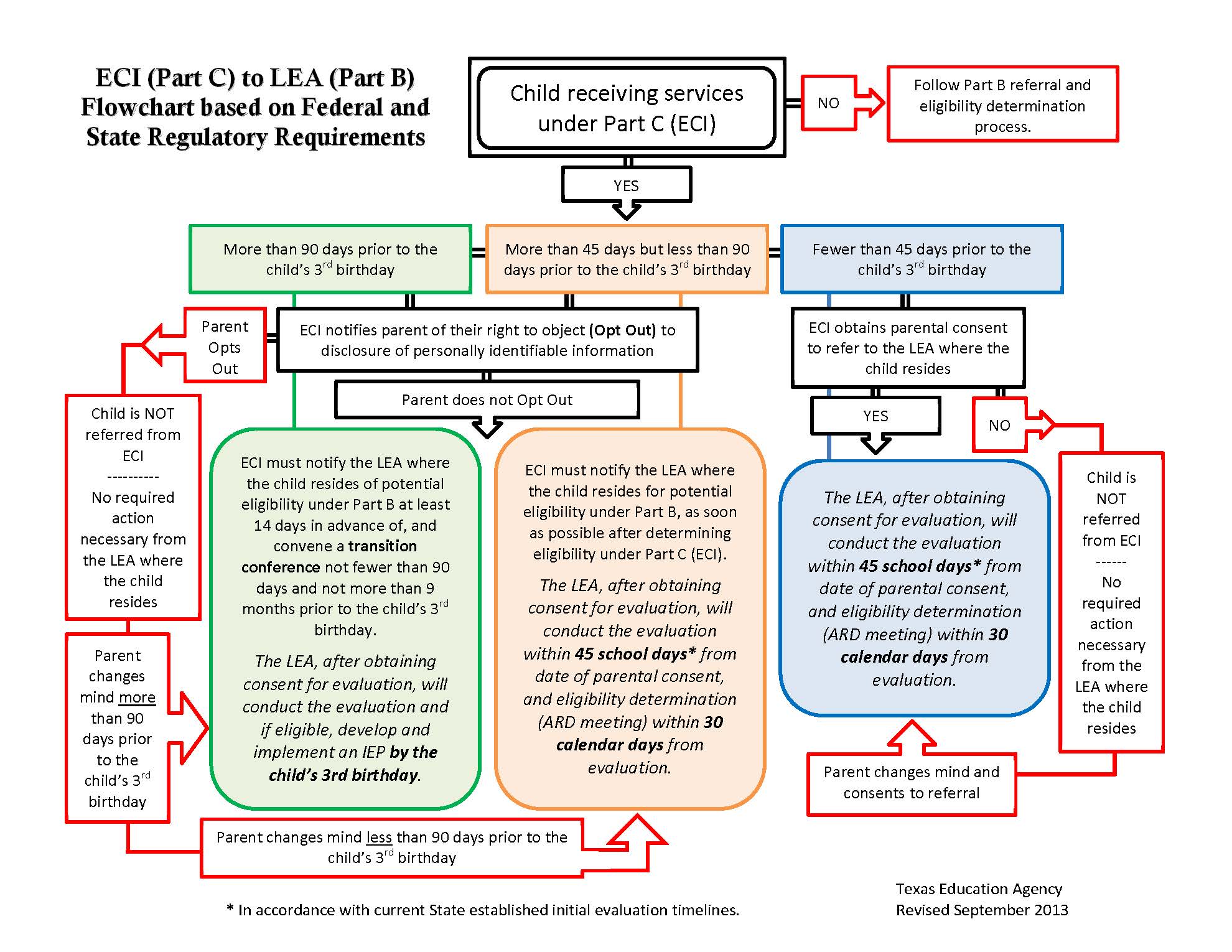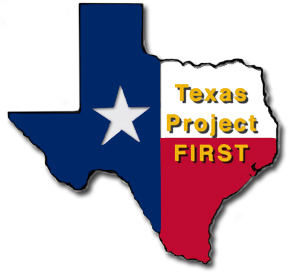en Español • Share • 

If your infant or toddler receives ECI services, your child will “graduate” from ECI on the day he or she turns three. However, planning for preschool begins much sooner. Between 90 days and 9 months prior to your child’s third birthday, your child’s ECI provider will schedule an Individualized Family Service Plan (IFSP) meeting to discuss your child’s preschool options and to develop a transition plan.
If your child has a disability, he or she may be eligible for special education preschool services under IDEA (Part B). The public school program for young children, ages 3-5, is called the Early Childhood Special Education (ECSE -formerly known as PPCD). Parents are often surprised to find that eligibility is very different for public school services than it is for ECI. Be aware that your child will not automatically qualify for public school programs based solely on his or her having received ECI services.
Be sure to tell your child’s ECI provider and provide your consent if you would like to have your child evaluated for PPCD services.
Consent to Share Information with the School District
ECI must obtain your written consent before notifying the district of your child’s potential eligibility and sharing contact information and your child’s records.
If you decline (or Opt Out), the process stops. Your child's information will NOT be shared with the school district, nor will your child be evaluated for public school services. If you change your mind, you can Opt In at a later date prior to your child’s third birthday.
If you give your consent (or Opt In), ECI will contact the school district where your child lives and share your contact information, your child’s comprehensive evaluation and the IFSP. The district will then arrange for an evaluation to determine whether your child has a disability that makes them eligible for special education services.
Referral Timeline
The preschool referral timeline is based on when your child began receiving ECI services relative to his or her third birthday.
If your child has received ECI services for more than 90 days prior to his or her third birthday:
- At least 90 days and not more than 9 months before your child turns three – ECI must hold a transition conference
- At least 14 days before your child turns three - ECI must notify your child’s school district that your child may be eligible for public preschool services.
- By your child’s third birthday - The school district (after obtaining your consent) must conduct an evaluation, make an eligibility determination and implement your child’s Individualized Education Program (IEP).
If your child has received ECI services for between 45 days and 90 days prior to his or her third birthday:
- As soon as possible after determining eligibility for ECI services - ECI must notify your child’s school district that your child may be eligible for public preschool services.
- Within 45 school days from the date of parental consent - The school district must conduct an evaluation.
- Within 30 calendar days from the evaluation date - The school district must convene an ARD meeting to make an eligibility determination and develop the IEP.
If your child has received ECI services for less than 45 days prior to his or her third birthday:
- Within 45 school days from the date of receiving parental consent - The district must conduct an evaluation.
- Within 30 calendar days from the evaluation date - The school district must convene an ARD meeting to make an eligibility determination and develop the IEP.
Once the school is notified that a child receiving ECI services is potentially eligible, the school treats this as an initial referral and must provide the parent with a copy of the procedural safeguards notice.
If your child is eligible for public preschool services, you will be invited to attend an Admission, Review, and Dismissal (ARD/IEP) meeting. This is a very important meeting where you will help the IEP team identify the most appropriate placement and services for your child. Remember that from this point forward, you are a member of your child’s ARD committee and your input is considered when developing your child’s IEP.

What Parents Should Know
An entire year is devoted to preschool transition because it takes a lot of time to explore all the different possibilities for your child. A good place to start is by sitting down with your ECI provider to discuss the hopes and dreams you have for your child. Picture the ideal setting where your child can play, learn and grow in preparation for kindergarten and beyond.
Use this time to visit different programs in your school district and community and start getting to know the people who may be working with your child. Take notes about your observations, and keep a file of all documents and contact information. Don’t hesitate to ask questions. Discuss any concerns you may have with your ECI provider. Always consider how a particular program reflects the hopes and dreams you have for your child.
When exploring all the different preschool programs, parents and the ECI provider should take the following factors into consideration:
- Opportunities for your child to interact and develop friendships with children without disabilities. Research shows that children learn best from their typically developing peers. Play is an important part of a preschooler’s development, and children without disabilities provide positive behavior and speech models.
- Your vision for elementary school and how to best prepare your child for that transition (at the age of 5). Remember that children with disabilities are entitled to a Free and Appropriate Education (FAPE) in the Least Restrictive Environment (LRE). The more opportunities your preschooler has to learn and play with his or her non-disabled peers, the better prepared he or she will be to participate in inclusive settings later on. Also, this is a good time to familiarize yourself with the state’s Prekindergarten Curriculum Guidelines to understand what is expected of all preschoolers in Texas in preparation for public kindergarten and elementary school.
- The child’s therapeutic needs and where those therapies can best be delivered. Keep in mind that therapies in schools are educationally based. Public schools are only required to offer the “related services” that will enable a student to benefit from special education. The therapies offered through the public schools are not intended to replace the medically based therapies your child requires outside his or her educational setting. You and your ECI provider will use this transition phase to help research other resources for the therapies and services that are not provided by the school district. Your ECI provider may also be able to train you and/or family members to work with your child at home.
- The supports your child needs to be successful in a particular setting. For some parents, the thought of their young child with a disability “keeping up” in a busy, typical preschool classroom is daunting. However, with the right supports and services, preschoolers can successfully work toward their own goals, at their own pace, while enjoying the benefits that an inclusive classroom setting has to offer.
Preparing for the First Day of Preschool
Whatever option you choose for your child, remember that a smooth transition requires planning. Here are some tips to help your child prepare for the first day of preschool:
- Make an appointment for your child to meet his or her new teacher prior to the first day. If at all possible, meet in the setting where your child will be receiving services so he or she will feel more comfortable the first day in new surroundings.
- While at the meeting, ask if you can take photos of the teacher and the classroom. Keep them somewhere at home where you and your child can view and discuss them often.
- Read your child books about the first day of school. The Kissing Hand by Audrey Penn and Don’t Go by Jane Breskin Zalben are popular selections.
- Make a student introduction portfolio. Be sure that teachers, therapists and paraprofessionals working with your child receive a copy well in advance so they can get to know your child beyond his or her disability.
- Allow your child to take a small favorite toy or a photo of your family to school on the first day. This is a great “ice breaker” to conversations and can provide that little extra bit of security.
See also:
Early Childhood Special Education
Additional Resources:
Pacer Center Resources - Top Concerns for Parents of Children Birth to 5
TEA – Early Childhood Education: Family Resources
TEA - Transition from ECI Flowchart (pdf)
